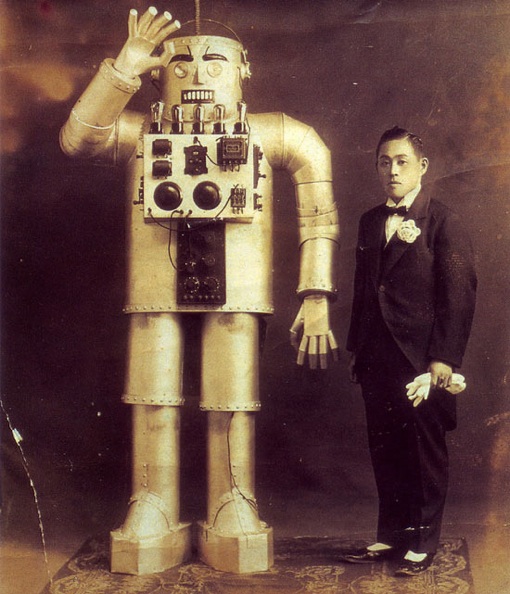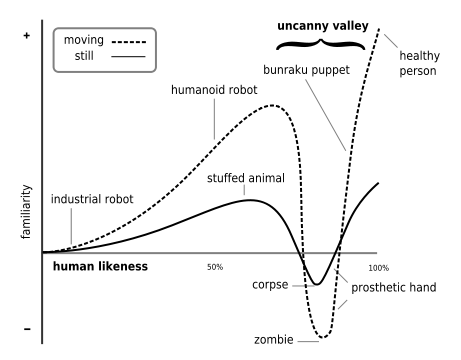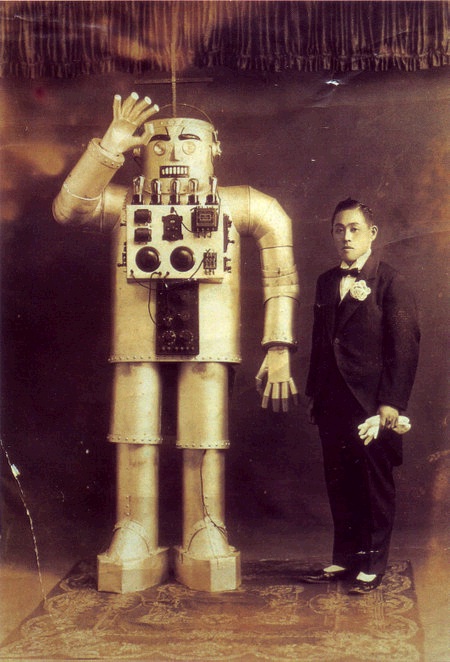
Image Credit: Retrolicious via Bioephemera
Inspired by Elizabeth’s close reading earlier this week, I thought I’d attempt to make sense of my attraction to the digital image above, which has been adorning my desktop for the past month or so. Pictured are Japanese inventor Yasutaro Mitsui and his steel humanoid, circa 1932. Why is this duo so appealing—and arresting? A few speculations after the jump.
The modernity of the mechanical robot contrasts strikingly with Mitsui’s formalwear and the plush ornamental carpet beneath them. The crease in the bottom left corner, which suggests the textural materiality of an “original” sepia-toned photograph, underscores the image's digital nature. There's also something both pleasurable and unsettling about the interpretive questions raised by encountering a contextless image. Though a modicum of digging tells me that it was reprinted in Haruki Inoue's Nihon Robotto Soseiki 1920-1938 (1993), I don't know who took this image and under what circumstances. What were the contexts in which viewers, such as Mitsui himself, might have understood it?

Image Credit: Wikipedia (Creative Commons)
Another clue to the image's appeal comes from an unlikely source: a graph named after Freud’s concept of the uncanny. The “uncanny valley,” a term coined by Japanese roboticist Masahiro Mori, describes our considerable drop in comfort level when we encounter robot models that too closely resemble the human form. (For an overview of the phenomenon, which is not limited to our species, see this SEED article.) The humanoid here manages to avoid tumbling into the uncanny valley: the exposed electronics and steel rivets exaggerate its morphological and material difference, while its gesture of greeting offers a comforting sense of human familiarity.
And yet, the overall image isn’t merely cute or cutesy, nor does it fully banish a minor note of unease, of uncanniness. The image’s success hinges on a visual antithesis, as its composition sets up a comparison of human and humanoid. As I discovered when I came across the alternative version below, the aesthetic choice to crop the image makes it more compelling, removing unnecessary detail and distance so that we focus on its two central figures. The robot’s easeful welcome and open, animated stance call attention to Mitsui’s stern visage and wooden posture, his mechanical stiffness and discomfort. As one blogger noted, “I believe his robot looks friendlier than the inventor.” Both end up objectified under the camera’s gaze, through which they reflect and refract each other's traits.

Image Credit: Cybernetic Zoo
Ultimately, I'm still unsure about the fascination this image holds for me (which is reflected in my imprecision here). I’m curious if my response is purely subjective, or if this image stirs a frisson-like feeling in others?
Recent comments
2 years 29 weeks ago
2 years 44 weeks ago
2 years 44 weeks ago
2 years 50 weeks ago
3 years 4 weeks ago
3 years 4 weeks ago
3 years 4 weeks ago
3 years 6 weeks ago
3 years 6 weeks ago
3 years 6 weeks ago